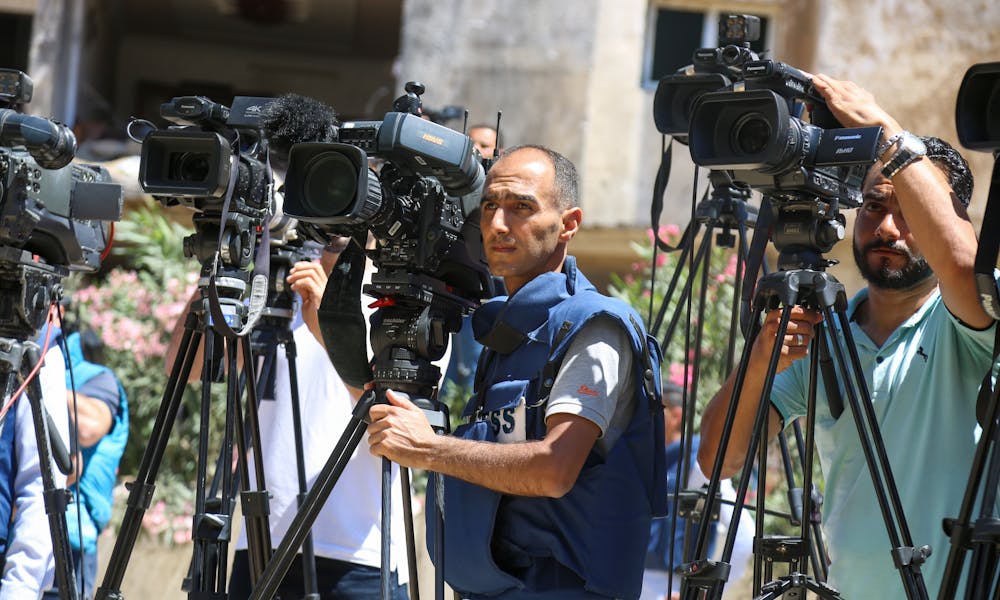President Joe Biden said that he hopes for a truce in the Israel-Hamas war by “next Monday.”
“Well, I hope by the beginning of the weekend, I mean, the end of the weekend,” Biden replied when asked when a ceasefire would begin during an appearance with comic Seth Meyers at an ice cream shop in New York City on Monday. “My national security advisor tells me we’re getting close. We’re getting close, but it’s not quite done. And my goal is that by next Monday, we’ll have a ceasefire,” Biden said.
Earlier on Monday, Media reported that Hamas had backed off some critical demands in the negotiations for a hostage deal. A pause in the fighting in Gaza after Israeli accusations that its position was “delusional,” bringing the negotiating parties closer to an initial agreement that could halt the fighting and see a group of Israeli hostages released, according to two sources familiar with the talks.
“The major obstacles have been resolved in terms of Hamas insisting on a full withdrawal of Israeli forces and an end to the war,” a senior Biden administration source told Media after a meeting in Paris on Friday involving US, Egyptian, and Israeli intelligence chiefs and Qatar’s prime minister.
“Hamas’ requirements for the numbers of Palestinians [prisoners that] would have to be freed has declined,” the source went on to say.
A diplomatic source involved with the negotiations revealed that Hamas changed its stance in anticipation of an agreement on the first part of the arrangement. It is predicted that additional difficult obstacles would surface later, when complicated topics such as Hamas releasing male IDF captives and an end to the conflict are considered.
Those involved in the discussions have stated that an agreement would most likely be implemented in stages and that once an initial deal is reached, it could lead to a six-week truce in which a group of Israeli hostages, including women, children, the elderly, and the sick, would be released in exchange for a smaller number of Palestinian prisoners than Hamas had originally requested.
The second round of conversations is likely to be significantly more challenging.
During a ceasefire, discussions would focus on more delicate matters such as the release of Israeli captives, Palestinian prisoners serving harsher sentences, the departure of IDF troops, and putting the conflict to a stop permanently, as well as the “day after” difficulties.
Israeli authorities have said that they aim to begin a military incursion into Rafah. At the same time, Hamas previously stated that a second phase will be used to negotiate “the requirements necessary for the continuation of the mutual cessation of military operations.”
We made headway in our discussions over the weekend and the previous few days” to attempt to strike an agreement to liberate the captives and achieve a temporary truce, State Department spokeswoman Matt Miller said Monday.
Miller said at a department briefing, “We continue to believe that a deal is possible, and we’re going to pursue it.”
Miller went on to say that if Hamas “truly cared about the Palestinian people, they should agree to the deal that is on the table because it will greatly alleviate the suffering of those Palestinian people.”
On Sunday, US national security advisor Jake Sullivan refused to elaborate on the parameters under discussion but said Friday’s meeting in Paris resulted in “an understanding among the four of them about what the basic contours of a hostage deal for a temporary ceasefire would look like.”
“There will have to be indirect discussions by Qatar and Egypt with Hamas because ultimately they will have to agree to release the hostages,” Sullivan was quoted as saying by Media. “That work is now ongoing. We hope that in the following days, we can reach a strong and definitive resolution on this matter. But we’ll have to wait and see!”
Israel said on Monday that it was sending a delegation to Doha after Israeli Prime Minister Benjamin Netanyahu was less dismissive of the status of the discussions on Sunday than he has been in recent weeks.
“They have to come down to reality,” Netanyahu stated of Hamas on Fox News. “And I believe that if that is the case, we will be able to get the agreement that we desired.
Netanyahu is under intense pressure from the Israeli people to release the more than 130 captives being held in Gaza, including the remains of several who are thought to be dead.
The beleaguered prime minister also restated his intention to send the Israeli army into Rafah, which the US has warned it would veto unless a concrete plan is in place to ensure the safety of the approximately 1.5 million Palestinians who are concentrated there, many of whom have fled the fighting farther north.
With or without a hostage arrangement, Netanyahu told CBS News, “We will do it anyway” because “total victory is our goal.”
“We can’t leave the last Hamas stronghold without taking care of it,” Prime Minister Benjamin Netanyahu stated.


